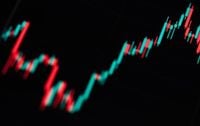The MSCI World Index has long been a staple for investors, boasting an average return of 7.7 percent since 1970. However, recent market fluctuations have raised concerns about its future performance, particularly as the index faces significant challenges from economic and political factors.
For many investors, the iShares MSCI World ETF serves as the backbone of their portfolios, bundling over 1,500 stocks from industrialized countries worldwide, with a clear emphasis on the United States. But this focus on U.S. equities is becoming increasingly problematic. In recent weeks, the ETF has seen a marked decline in value, sparking discussions about the sustainability of its long-term returns.
One key factor contributing to the MSCI World’s success has been the prolonged decline in interest rates, which began in the 1980s. This trend has historically boosted stock prices, particularly in the U.S., where the index is heavily weighted. Currently, U.S. stocks account for about 73 percent of the MSCI World, with a significant portion coming from technology giants such as Apple, Microsoft, and Nvidia. These companies have been under pressure due to political and economic uncertainties stemming from former President Donald Trump’s trade policies, including new tariffs that have created market chaos.
According to reports, the initial excitement following Trump's election has faded, leading investors to worry about the negative repercussions of his administration's policies. As a result, there has been a notable sell-off of U.S. stocks, which has directly impacted the MSCI World Index. Analysts at Finanztip predict that, given the current climate, the average long-term return on stocks may drop to around 6 percent, a significant decline from the historical average.
The iShares MSCI World ETF has not been immune to these trends. Since February, the fund has experienced price losses of approximately ten percent, a decline exacerbated by the recent weakness of the U.S. dollar against the euro. This currency fluctuation has compounded the situation for European investors holding the ETF, as a weaker dollar diminishes returns even when U.S. stocks perform well in their local currency.
Investors are now left grappling with the question of whether this downturn is merely a market correction or the onset of a prolonged crisis. Historical data offers some reassurance; the MSCI World has consistently rebounded after significant downturns, whether from the Dotcom bubble, the financial crisis, or the COVID-19 pandemic. Though recovery can take years, it has always occurred. The key takeaway for investors is that remaining invested during downturns is crucial for long-term gains. Selling in a panic often locks in losses and prevents participation in subsequent recoveries.
As the markets continue to fluctuate, experts suggest that investors should consider their strategies carefully. For those who are invested for the long haul, patience may be the best approach. However, if anxiety persists, there are a couple of strategies to consider. First, increasing diversification could mitigate risks associated with the MSCI World’s heavy U.S. focus. Adding ETFs that target emerging markets or European stocks can help reduce reliance on the U.S. market.
Second, investors should assess their risk profiles. Those who find it challenging to weather market volatility may have overexposed themselves to equities. A more balanced portfolio that includes bonds or commodities could provide greater stability.
In summary, while the MSCI World and its associated ETFs have historically offered solid returns, the current market environment presents unique challenges. The heavy reliance on U.S. technology stocks, coupled with economic uncertainties, has led to a significant decline in value. Investors must navigate these turbulent waters with a clear strategy, whether that means holding steady and waiting for recovery or re-evaluating their investment approaches to ensure long-term success.
As the situation evolves, staying informed and adaptable will be key for investors looking to weather the storm and capitalize on future opportunities.




